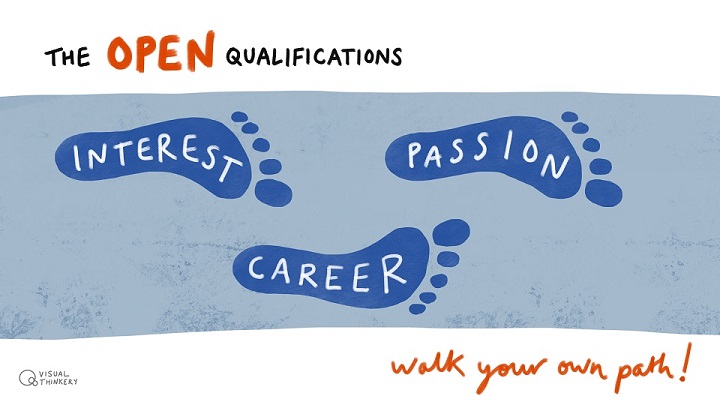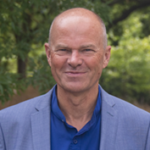
Prof. John Butcher is Director for Access, Open & Cross-curricular Innovation at the Open University.
I was asked to write a blog for the Open qualifications blog site at the precise moment when my colleagues knew I was unlikely to refuse…
Picture the scene, a new pub by the canal in Milton Keynes, on a September evening, and I had just delivered my inaugural lecture in the Berrill Theatre on the Walton Hall campus. I was in the pub with a few kind colleagues who wanted to celebrate the occasion with me – and because a lot of my lecture was about achievements within a team and being open to new opportunities.
I reflect there are many arcane aspects to being an academic, not the least the language we all take for granted (and the bloody acronyms), but an inaugural lecture is a bit special even in the weird confines of university culture. Most universities offer inaugural lectures, essentially a public lecture on a self-chosen topic as acknowledgement of a new Chair (promotion to Professor). I had not realised you are invited to present an inaugural lecture – it is not automatic, so someone (I suspect my Faculty Dean) put me forward. It felt an immense honour, but also scary. What could I say that would be both engaging and enlightening, with any coherence, for 40 minutes to a very mixed audience?
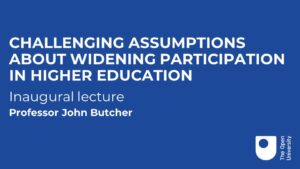 I chose to title my lecture ‘Challenging Assumptions about Widening Participation in Higher Education’, and I framed it as a synthesis of various bits of writing and research I had done in the previous decade, viewed through an autobiographical lens of my own educational journey. It took a long time to prepare something I was comfortable with, searching for incriminating photographs of various hairstyles as schoolboy wannabe footballer, punky student, Dad to six children, teacher and University lecturer to balance the less-than-exciting images of journal and book covers. Maybe I shouldn’t have gone to the inaugural a few months before mine by the Astrobiology Professor who had amazing photos and films of her research at the Poles (and into space). Thankfully, my more personal approach seemed to work on the day though.
I chose to title my lecture ‘Challenging Assumptions about Widening Participation in Higher Education’, and I framed it as a synthesis of various bits of writing and research I had done in the previous decade, viewed through an autobiographical lens of my own educational journey. It took a long time to prepare something I was comfortable with, searching for incriminating photographs of various hairstyles as schoolboy wannabe footballer, punky student, Dad to six children, teacher and University lecturer to balance the less-than-exciting images of journal and book covers. Maybe I shouldn’t have gone to the inaugural a few months before mine by the Astrobiology Professor who had amazing photos and films of her research at the Poles (and into space). Thankfully, my more personal approach seemed to work on the day though.
Having re-read most things I had written, and searched my archive (a shelf on my bookcase), I structured my talk into five chronological sections:
- Personal beginnings (I was determined to acknowledge my parents,
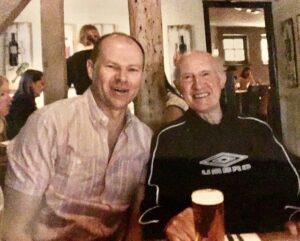
John and his Dad neither of whom had the opportunities I had, leaving school with no qualifications at 14. Especially my dad who died at 96 a few weeks after learning I had been made Professor). And to illustrate scraping three grade Es at A level is not necessarily terminal…
- Widening Participation in practice (tracing the journey from my Polytechnic degree in English & History with subsidiaries in Sociology and Psychology, through MA in Victorian Studies and a PGCE in English to teaching in FE and sixth forms and MEd).
- Developing inclusive teaching (thriving in a teacher training/development role at the OU, getting my EdD, writing articles and books before leading Learning and Teaching in Falmouth, Northampton and Derby universities).
- Widening Participation (returning to the OU to lead the Access Programme and some national studies on part-time HE).
- Widening Participation research (editing an international journal, leading scholarship on the Access modules and challenging sector assumptions that not all students are 18-year-old school leavers with excellent A levels…)
As I prepared for my lecture, I became increasingly aware how much my educational and professional journey aligned with many of the Open degree students I have been fortunate enough to meet at Boards of Studies and Teaching Committees and at graduation ceremonies. There is something about being open to new opportunities, to not feel confined by narrow disciplines, to want to explore connections between subjects, to not feel defined by previous learning (for example ‘failing’ at school or embarking on degree study later in life).
Looking back, I now recognise doing a joint honours degree was about refusing to limit myself to one area when I enjoyed more than one – and I was open to learning new things from subsidiaries which had not been taught when I was at school. I also highlighted in my lecture that choosing to do an interdisciplinary Masters in Victorian Studies was as far away from guaranteeing employability as it was possible to get, and yet it eventually helped me get a tutoring role with the OU and has given me much pleasure over the years to argue that any interesting development in the twentieth century had its origins in the nineteenth! And shifting from the arts to education in my thirties definitely enabled some non-linear career moves.
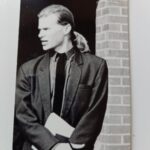 Being open to opportunities, both in interdisciplinary learning and unexpected job directions also led me in unimaginable directions. Without my ‘open’ qualifications and openness to saying ‘yes’ to opportunities, I would not have danced to Wordsworth poems, earned my first graduate money as a (whisper it) life model, been knocked off my moped in Oxford during my PGCE by Jeremy Thorpe (google him!), met Tracey Emin and Grayson Perry and the Queen and Prince Philip and Princess Margaret, or even flown (first at the ripe old age of 40 as some of my partner schools were on the Channel Isles).
Being open to opportunities, both in interdisciplinary learning and unexpected job directions also led me in unimaginable directions. Without my ‘open’ qualifications and openness to saying ‘yes’ to opportunities, I would not have danced to Wordsworth poems, earned my first graduate money as a (whisper it) life model, been knocked off my moped in Oxford during my PGCE by Jeremy Thorpe (google him!), met Tracey Emin and Grayson Perry and the Queen and Prince Philip and Princess Margaret, or even flown (first at the ripe old age of 40 as some of my partner schools were on the Channel Isles).
My inaugural lecture was an unplanned-for culmination of my educational career, one that would have been far narrower, more linear, and less interesting without being open to what connections could be made. Being open is good.
The recording of John’s inaugural lecture is available to watch here.
